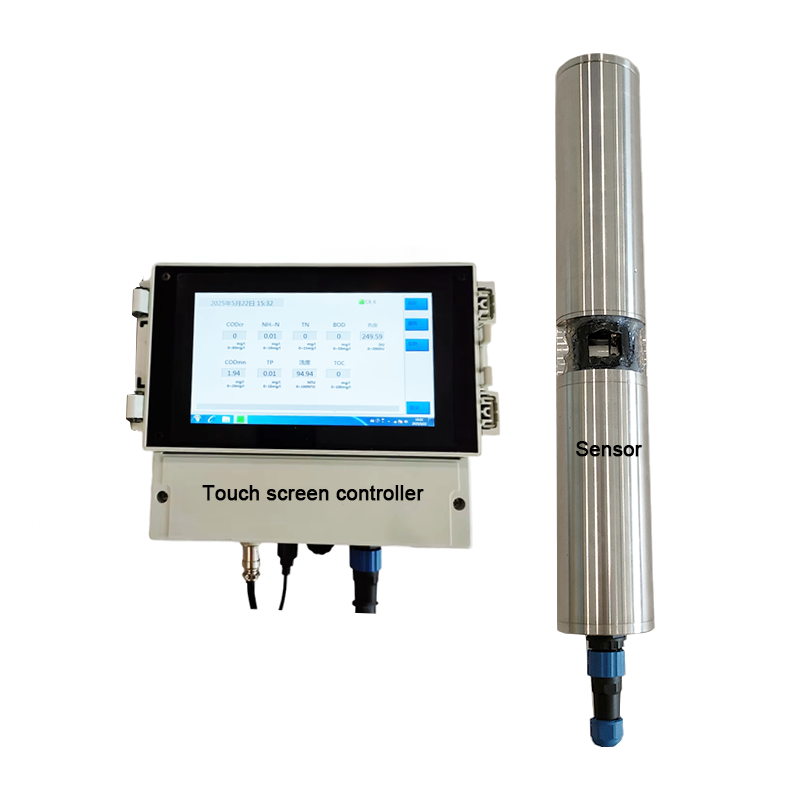Ọjọ́ tí a tú síta: May 27, 2025
Orísun: Ile-iṣẹ Iroyin Imọ-ẹrọ
Bí ìmọ̀ kárí ayé nípa ìṣàyẹ̀wò àti ààbò dídára omi ṣe ń pọ̀ sí i, ìbéèrè fún àwọn sensọ̀ dídára omi tí ó wà ní ipò ń pọ̀ sí i. Àwọn sensọ̀ tó ti ní ìlọsíwájú wọ̀nyí lè ṣe àkíyèsí àwọn ìṣẹ̀dá kẹ́míkà àti àwọn èròjà tí ó ń bàjẹ́ nínú omi ní àkókò gidi àti pẹ̀lú ìṣedéédé gíga, èyí tí ó ń pèsè ìrànlọ́wọ́ ìmọ̀-ẹ̀rọ pàtàkì fún ààbò àyíká àti ìṣàkóso àwọn ohun àlùmọ́nì omi.
1. Ìṣàyẹ̀wò Ìbéèrè Ọjà Àgbáyé
Gẹ́gẹ́ bí ìròyìn tuntun láti ọ̀dọ̀ àwọn ilé iṣẹ́ ìwádìí ọjà, ìbéèrè fún àwọn sensọ̀ dídára omi onípele-ìrísí lágbára ní àwọn orílẹ̀-èdè àti agbègbè wọ̀nyí:
- Orílẹ̀-èdè Amẹ́ríkàNítorí àwọn ìlànà tó lágbára nípa ìbàjẹ́ omi àti ilé iṣẹ́ omi ńlá, àwọn ẹ̀rọ ìwádìí tó ń mú kí omi dára sí i ni wọ́n ń lò fún ìtọ́jú omi ìlú, ìtọ́jú omi oko, àti ìtọ́jú àyíká.
- Ṣáínà: Ní ìdáhùn sí àwọn ọ̀ràn ìbàjẹ́ omi líle koko, ìjọba orílẹ̀-èdè China ti mú kí àwọn ìdókòwò pọ̀ sí i nínú ìṣàyẹ̀wò dídára omi, èyí sì ń mú kí àwọn sensọ̀ wọ̀nyí ṣiṣẹ́ nínú ìṣàkóso omi àti ìtọ́jú omi ìdọ̀tí ilé iṣẹ́.
- Íńdíà: Pẹ̀lú àìtó àwọn ohun àlùmọ́nì omi tó ń burú sí i, ìbéèrè Íńdíà fún àwọn ẹ̀rọ ìṣàyẹ̀wò dídára omi tó gbéṣẹ́ ti pọ̀ sí i, àti pé àwọn sensọ̀ dídára omi tó wà ní ipò náà ti di ohun èlò tí a fẹ́ràn jùlọ fún ṣíṣàyẹ̀wò dídára omi.
- Jẹ́mánì: Gẹ́gẹ́ bí aṣáájú nínú ìmọ̀ ẹ̀rọ àyíká ní Yúróòpù, Jámánì ń lo àwọn sensọ̀ dídára omi ní ibi tí ó wà nínú ìtọ́jú omi ilé iṣẹ́ àti àwọn ètò omi ìlú láti rí i dájú pé ó bá àwọn ìlànà EU mu.
A tun pese orisirisi awọn solusan, pẹlu:
- Mita ọwọ fun didara omi oni-nọmba pupọ
- Eto buoy lilefoofo fun didara omi-pupọ
- Fọ́lẹ̀ ìfọmọ́ aládàáṣe fún àwọn sensọ omi oní-pírẹ́ẹ̀tì púpọ̀
- Gbogbo àwọn olupin àti module alailowaya software, tí ó ń ṣe àtìlẹ́yìn fún RS485, GPRS/4G/WIFI/LORA/LORAWAN
2. Àwọn Ìṣẹ̀lẹ̀ Ìlò
Àwọn ojú ìwòye ìlò tó gbòòrò fún àwọn sensọ̀ dídára omi onípele-apá ...
- Àbójútó Àyíká: Ṣíṣe àkíyèsí ní àkókò gidi lórí àwọn odò, adágún, àti òkun, kíákíá láti mọ àwọn ìyípadà nínú dídára omi àti láti ran àwọn ilé iṣẹ́ ààbò àyíká lọ́wọ́ láti gbé ìgbésẹ̀ ní àkókò.
- Isakoso Omi Mimu: Ṣíṣe àbójútó dídára omi nínú àwọn ètò ìpèsè ìlú láti rí i dájú pé omi mímu wà ní ààbò àti láti dènà àwọn ìṣẹ̀lẹ̀ ìbàjẹ́.
- Ìtọ́jú Omi Ẹ̀gbin Ilé-iṣẹ́: Abojuto akoko gidi ti itusilẹ omi idọti ni awọn ile-iṣẹ iṣelọpọ ati kemikali, rii daju pe awọn ile-iṣẹ tẹle awọn ilana ayika ati dinku ipa ayika.
- Iṣẹ́ Ìgbóná Ogbin: Ṣíṣe àkíyèsí dídára omi ìrísí omi láti ran àwọn àgbẹ̀ lọ́wọ́ láti mú kí ìfọ́mọ àti lílo omi sunwọ̀n síi, láti mú kí iṣẹ́ àgbẹ̀ sunwọ̀n síi àti láti máa tẹ̀síwájú.
- Ẹja omi: Ṣíṣe àbójútó dídára omi ní àwọn oko ìgbẹ́ omi láti rí i dájú pé àyíká ìbísí wà ní ìlera àti láti mú kí dídára àti ààbò àwọn ọjà omi pọ̀ sí i.
3. Àwọn Àǹfààní Ìmọ̀-ẹ̀rọ
Àwọn sensọ̀ dídára omi inú omi ń lo ìmọ̀ ẹ̀rọ ìwádìí spectral láti ṣàwárí ọ̀pọ̀lọpọ̀ pàrámítà nínú omi, títí bí atẹ́gùn tí ó ti yọ́, turbidity, pH, nitrogen, àti phosphorus. Àwọn àǹfààní pàtàkì wọn ni:
- Àbójútó Àkókò Gidi-gidi: Pípèsè àbájáde ìwífún lẹ́sẹ̀kẹsẹ̀ láti mú kí ìpinnu kíákíá rọrùn.
- Pípé Gíga: Ṣíṣe àfihàn onírúurú àwọn àmì dídára omi dáadáa, tí ó ń mú kí ìgbẹ́kẹ̀lé ìṣàyẹ̀wò pọ̀ sí i.
- Ìmúṣiṣẹ́ Rọrùn: O dara fun orisirisi awọn agbegbe omi laisi itọju iṣaaju tabi awọn ilana gbigba awọn ayẹwo.
4. Ìwòye Ọjọ́ Ọ̀la
Bí àfiyèsí kárí ayé lórí ààbò àyíká omi ṣe ń pọ̀ sí i, àwọn àǹfààní ọjà fún àwọn sensọ̀ dídára omi tí ó wà ní ipò náà gbòòrò. A retí pé ní àwọn ọdún tí ń bọ̀, bí ìmọ̀ ẹ̀rọ ṣe ń tẹ̀síwájú àti bí owó ṣe ń dínkù, àwọn sensọ̀ wọ̀nyí yóò gbilẹ̀ sí i ní onírúurú ilé iṣẹ́ àti orílẹ̀-èdè, èyí tí yóò sì ṣe àfikún pàtàkì sí ìṣàyẹ̀wò àti ìtọ́jú dídára omi.
Ìparí
Ìfarahàn àwọn sensọ̀ dídára omi tí ó wà ní ipò yìí fi hàn pé ó ṣe pàtàkì nínú ìmọ̀ ẹ̀rọ ìṣàyẹ̀wò dídára omi, èyí tí ó ń pèsè ìrànlọ́wọ́ tó lágbára fún ìṣàkóso àwọn ohun àlùmọ́nì omi kárí ayé tí ó lè pẹ́ títí. Pẹ̀lú ìlọsíwájú nínú ìmọ̀ sáyẹ́ǹsì àti ìmọ̀ ẹ̀rọ àti bí ọjà ṣe ń pọ̀ sí i, a ó rí ìlò ìmọ̀ ẹ̀rọ yìí ní ọ̀pọ̀ orílẹ̀-èdè àti ẹ̀ka ní ọjọ́ iwájú.
Fun alaye siwaju sii nipa awọn sensọ didara omi, jọwọ kan si:
Ile-iṣẹ Imọ-ẹrọ Honde, LTD.
Imeeli:info@hondetech.com
Oju opo wẹẹbu Ile-iṣẹ:www.hondetechco.com
Foonu: +86-15210548582
Àkókò ìfìwéránṣẹ́: May-27-2025


